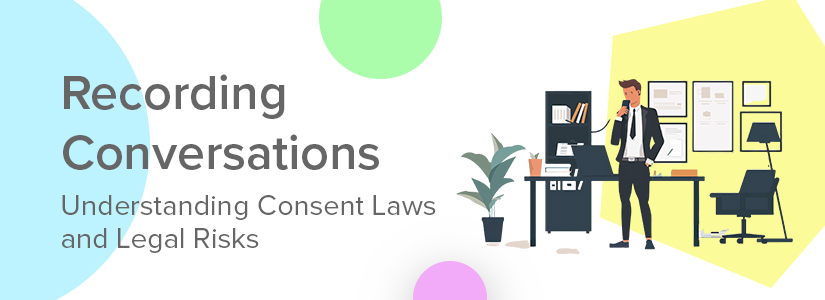Recording Conversations: Understanding Consent Laws and Legal Risks

High-profile legal cases have shown the severe consequences that can arise from illegal recordings, including major lawsuits and heavy penalties. Therefore, it is essential for organizations and individuals alike to understand the legal framework that governs recording conversations.
Recording conversations has become a widespread practice due to the accumulation of smartphones and digital devices. Whether it’s for professional, personal, or legal use, recording conversations allows people to capture important moments and protect their interests. However, despite its usefulness, recording conversations comes with significant legal responsibilities, particularly when it comes to consent laws. Ignorance of these laws can lead to costly legal battles, fines, and damage to personal and professional relationships.
In this article, we will explain the various consent laws in the United States, the differences between one-party and two-party consent states, the federal regulations that govern recordings, the complexities of recording across state lines, and the best practices to mitigate legal risks.
Understanding the Legal Landscape of Recording Conversations
At its core, recording conversations refers to capturing audio or video of spoken words or sounds. The practice can range from recording a phone call, capturing a face-to-face discussion, and even recording a video conversation over the internet. The content could include private or business-related conversations. Yet, the act of recording someone without their consent can lead to violations of their rights, making it a crucial legal issue.
Recording conversations issues privacy concerns. Consent plays a central role in these laws, as it protects individuals from being secretly recorded without their knowledge or approval.
Recording a private conversation without consent can lead to allegations of violating someone’s right to privacy. Consent laws vary from state to state and are based on the idea that people should have control over their personal information and interactions, including the right to decide whether they want to be recorded.
Consent Laws in the United States
To understand recording laws, it is important to know the difference between two major terms used in this context: one-party consent and two-party (all-party) consent.
1. One-Party Consent:
In the United States, several states allow one-party consent when recording conversations. This indicated that as long as one participant in the conversation agrees to the recording, it is
considered legal. These states generally make it easier to record conversations for personal, business, or legal reasons without the need for permission from the other party involved.
One party consent states:
- New York: Follows the one-party consent rule where only one participant needs to consent to the recording.
- Texas: In most cases, Texas also adheres to the one-party consent rule. However, there are some exceptions, particularly in cases where the recording occurs in a business context.
- Illinois: Permits one-party consent for most types of recording, but restrictions apply in certain scenarios, such as when recordings are made in private settings.
The implications of one-party consent laws are significant for both personal and professional recordings. For instance, in a business context, an employer may record a conversation with an employee without informing them, which can sometimes lead to ethical dilemmas. While the law may allow such recordings, transparency is important to maintain trust and avoid potential retaliation.
2. Two-Party (All-Party) Consent:
On the other hand, there are several states in the U.S. that require all participants in a conversation to give consent for a recording to be legal. These states are more strict with privacy concerns as they believe everyone involved in the conversation should have control over whether or not it is recorded.
Two-party (all-party) consent states:
- California: Violating the two-party consent law in California can result in felony charges. Penalties may include up to three years in prison, substantial fines, or both. Civil lawsuits may also be filed by the parties whose privacy was invaded.
- Massachusetts: Violating Massachusetts two-party consent law can lead to criminal charges, including fines and imprisonment for up to five years. Additionally, individuals whose privacy rights were violated may pursue civil damages.
- Florida: Violating Florida’s two-party consent law is considered a third-degree felony. Offenders may face up to five years in prison, hefty fines, or both. Civil action may also be taken by those whose conversations were unlawfully recorded.
Federal Laws on Recording Conversations
In addition to state-specific laws, federal law also regulates the recording of conversations. The primary federal statute governing this area is the wiretapping statute (18 U.S.C. § 2511), which generally follows the one-party consent rule. Under this statute signifies that it is legal for a person to record a conversation as long as they are a party to the conversation or have
obtained consent from at least one participant. However, federal and state laws often interact with each other where consent requirements under state law may override federal law. In particular, if a state requires two-party consent and federal law permits one-party consent, the state law will take precedence.
There are some exceptions where federal wiretapping laws may not apply. Such as, law enforcement agencies may be allowed to record conversations without individual consent in the course of authorized investigations. These activities are typically carried out under strict rules and regulations and are often subject to judicial oversight.
Recording Phone Calls Across State Lines
One of the more complex issues in recording conversations arises when the recording spans multiple states. Since different states have different consent laws, this can create legal challenges, especially if a recording is made between a person in a one-party consent state and another person in a two-party consent state. The general rule in these cases is that the stricter law prevails. If one state requires all-party consent and the other state allows one-party consent, the law of the all-party consent state applies. Even so, this can create issues for businesses that operate in multiple states or individuals who communicate across state lines.
There have been several instances where recordings made across state lines have led to legal disputes. For example, if an individual recorded a phone conversation with someone in a
two-party consent state without informing them, they may face legal action later if the recording is used against them as evidence in a legal issue.
Lessons Learned and Best Practices
To avoid gray areas in relation to consent laws, it is recommended to obtain consent from all parties involved in the conversation, regardless of which state they are in. To mitigate the risks of legal repercussions and ensure compliance with recording laws, individuals and businesses can follow these guidelines:
1. Respect Privacy: Always prioritize the privacy of all parties involved in a conversation. Even if it is not required by law, informing others that they are being recorded helps maintain transparency and trust.
2. Know the Law: Before recording a conversation, be sure to understand both state and federal consent laws. Researching the recording requirements in your state where the conversation may take place is essential, especially for phone calls or video conferences that may involve people from different jurisdictions.
3. Be Transparent: If you plan to record a conversation, make sure all participants are aware of your intentions. In professional settings, transparency helps avoid misunderstandings and builds trust with clients, employees, and colleagues.
4. Obtain and Document Consent: Always obtain consent before recording a conversation. Depending on the situation, this may involve written consent or a verbal agreement. Documenting this consent can provide legal protection in the event of a dispute.
5. Seek Legal Advice: If you are unsure about the legality of recording a conversation, it is advisable to consult with a legal expert. Legal professionals can provide clarity on specific laws and help ensure compliance with state and federal regulations.
Conclusion
Recording conversations can be a useful tool for capturing information and protecting personal or professional interests, but it comes with significant legal responsibilities. Understanding the consent laws that govern the recording of conversations is essential for avoiding costly legal consequences. By familiarizing yourself with both state and federal laws, obtaining consent from all participants, and following best practices, you can ensure that your recordings remain legal and ethical. As privacy laws continue to evolve in the digital age, staying informed and practicing transparency will help navigate the legal landscape of recording conversations while protecting the rights of all parties involved.

